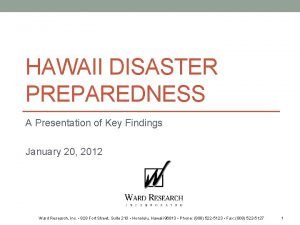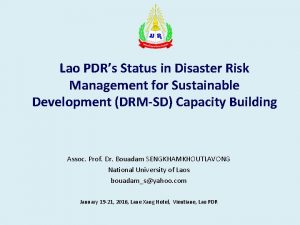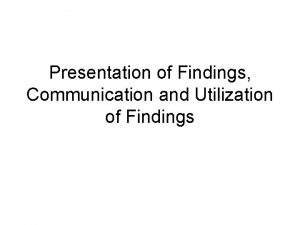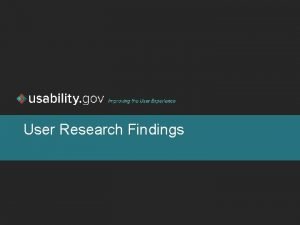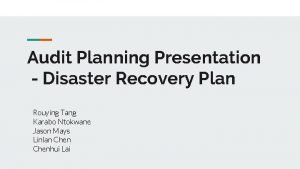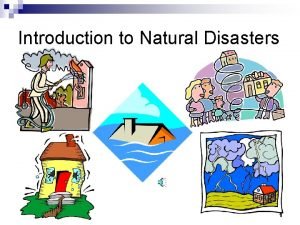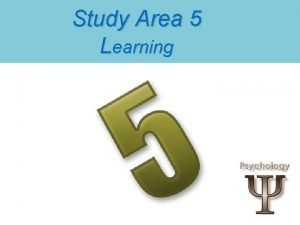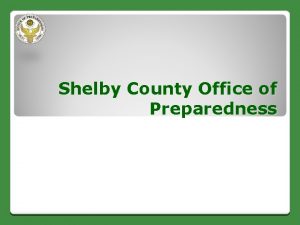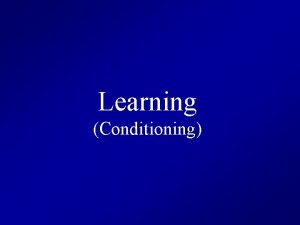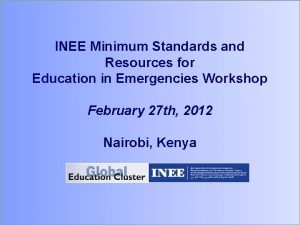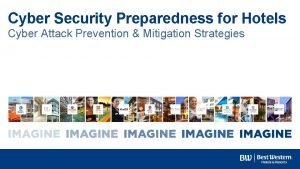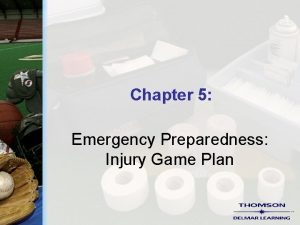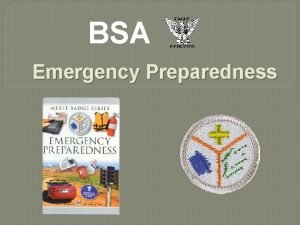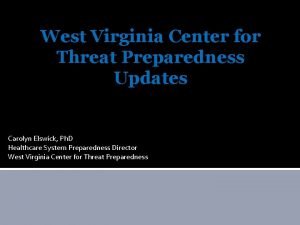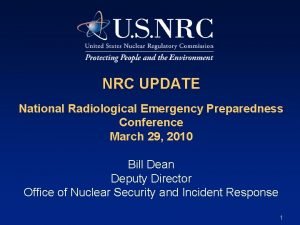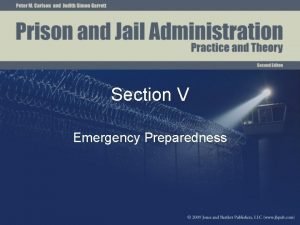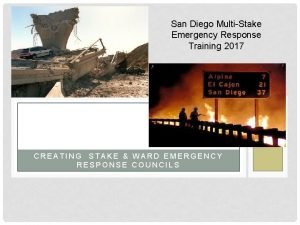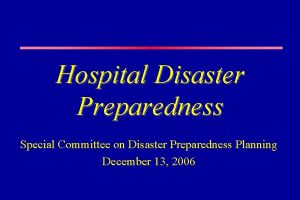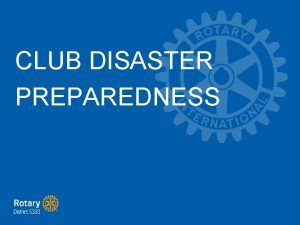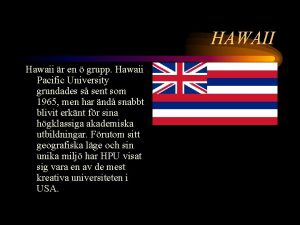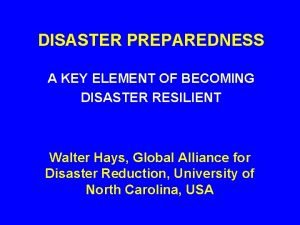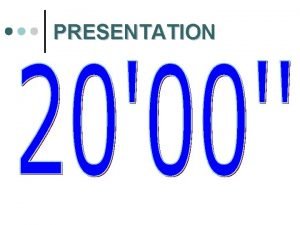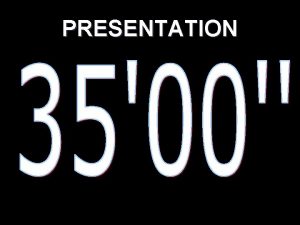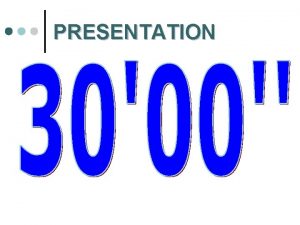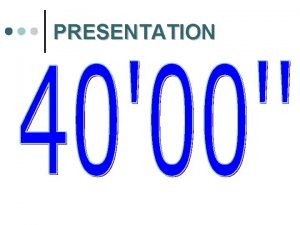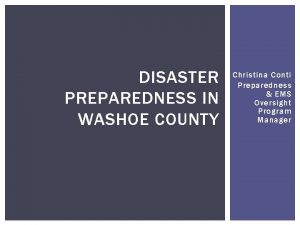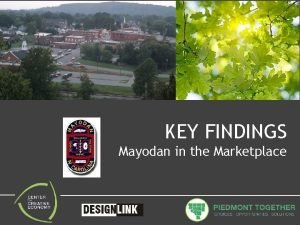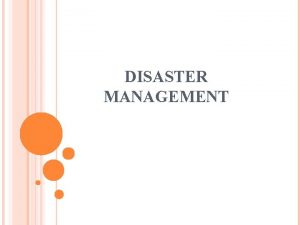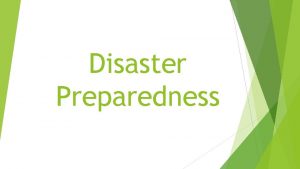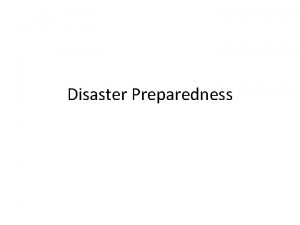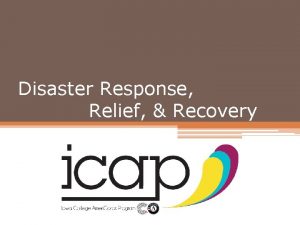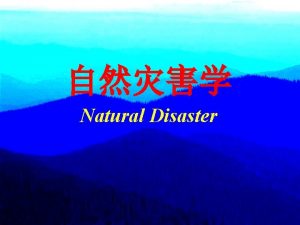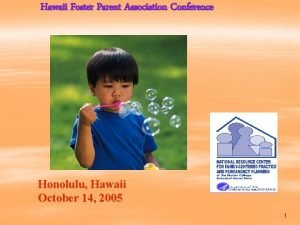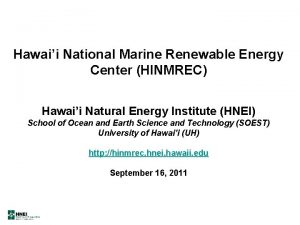HAWAII DISASTER PREPAREDNESS A Presentation of Key Findings

























- Slides: 25

HAWAII DISASTER PREPAREDNESS A Presentation of Key Findings January 20, 2012 Ward Research, Inc. • 828 Fort Street, Suite 210 • Honolulu, Hawaii 96813 • Phone: (808) 522 -5123 • Fax: (808) 522 -5127 1

OBJECTIVES AND METHODOLOGY Ward Research, Inc. • 828 Fort Street, Suite 210 • Honolulu, Hawaii 96813 • Phone: (808) 522 -5123 • Fax: (808) 522 -5127 2

Objectives The overall objective of the research was: TO MEASURE LEVELS OF KNOWLEDGE AND AWARENESS ABOUT DISASTER ISSUES, PLANS, AND PREPAREDNESS AMONG THE GENERAL POPULATION. Ward Research, Inc. • 828 Fort Street, Suite 210 • Honolulu, Hawaii 96813 • Phone: (808) 522 -5123 • Fax: (808) 522 -5127 3

Methodology • The 15 -minute telephone survey was conducted November 28 through December 17, 2011. • A total of n=1, 027 Hawaii State residents 18 + years old were surveyed. The table below presents the total number of surveys by county. n=775 were completed using Random Digit Dialing (RDD) Landline phone numbers. n=252 were completed using purchased cell phone numbers with 808 area codes. County Sample Size Maximum Margin of Error* Honolulu 418 +/-4. 7% Maui 201 6. 8% Kauai 203 6. 8% Hawaii 205 6. 8% 1, 027 2. 9% Total Statewide * at 95% confidence level. • Cellphone respondents were given either a $5 (check) or $7. 50 (Paypal) incentive for completing the survey. • The survey instrument was developed by Ward Research and submitted to the client for review and approval. A copy of the instrument is in the Appendix. Ward Research, Inc. • 828 Fort Street, Suite 210 • Honolulu, Hawaii 96813 • Phone: (808) 522 -5123 • Fax: (808) 522 -5127 4

Methodology (Continued) • All calling took place in the Calling Center in the Ward Research downtown Honolulu offices from 5 -9 p. m. on weekdays, and 9 a. m. to 8 p. m. weekends during the survey period. This Calling Center uses Computer -Assisted Telephone Interviewing (CATI) technology, which allows for 100% monitoring of calls through electronic and observational means. • Data processing was accomplished using SPSS for Windows, an in-house statistical software package, which allows for the cross tabulation of data by key variables (i. e. , age, ethnicity, and income). • Data was weighted by telecommunication services, age and ethnicity to more accurately reflect the population based on Census 2010. Ward Research, Inc. • 828 Fort Street, Suite 210 • Honolulu, Hawaii 96813 • Phone: (808) 522 -5123 • Fax: (808) 522 -5127 5

DETAILED FINDINGS Ward Research, Inc. • 828 Fort Street, Suite 210 • Honolulu, Hawaii 96813 • Phone: (808) 522 -5123 • Fax: (808) 522 -5127 6

PERCEPTIONS AND EXPERIENCES Ward Research, Inc. • 828 Fort Street, Suite 210 • Honolulu, Hawaii 96813 • Phone: (808) 522 -5123 • Fax: (808) 522 -5127 7

Residents are most concerned about Hurricanes and Tsunamis. Disasters Concerned About the Most 60% Hurricane Tsunami 51% Earthquake 21% Flood 11% Fire 6% High winds/Storms/Tornadoes 5% Volcanic eruption/Lava flows 3% Terrorism 2% Transportation Accident 1% Natural Disaster (General Mention) 1% Other 6% Don't know/Refused 8% 0% 25% 50% Q 2 a. When you think of disasters that may impact your community, which ones concern you the most? 75% 100% (n=1027) Ward Research, Inc. • 828 Fort Street, Suite 210 • Honolulu, Hawaii 96813 • Phone: (808) 522 -5123 • Fax: (808) 522 -5127 8

There is a higher level of concern regarding hurricanes than tsunamis. Not at all Concerned Hurricanes 5% 6% 7% Tsunamis Pandemic Flu 12% 10% 54% 24% 30% 32% 34% 26% 20% Very Concerned 54% 28% 14% 0% Somewhat Concerned 35% 12% Flash Floods Not very Concerned 40% 50% 60% 27% 70% 80% 90% 100% Q 2 b. I’m going to read you a list of some different disasters. For each one, please tell me how concerned you are about them. How concerned are you about hurricanes, tsunamis, pandemic flus, and flash floods? (n=1027) Ward Research, Inc. • 828 Fort Street, Suite 210 • Honolulu, Hawaii 96813 • Phone: (808) 522 -5123 • Fax: (808) 522 -5127 9

Certain segments of the population have greater concerns about different disasters. Hawaiians Low Income (<$35, 000 HHI) Mid-Low Income (<$75, 000 HHI) • More likely to state high levels of concern with disasters • More concerned with Pandemic Flu • More concerned with flash floods Ward Research, Inc. • 828 Fort Street, Suite 210 • Honolulu, Hawaii 96813 • Phone: (808) 522 -5123 • Fax: (808) 522 -5127 10

Residents feel most confident in the State handling natural disasters, but the least confident with public health disasters. Confidence Level in State’s Response to Emergencies or Disasters Not at all confident (1 -4) Natural disaster (hurricane, tsunami) (5 -7) 8% Terrorist attack (8 -9) 30% 19% Chemical disaster (oil spill, gas leak) 18% 27% 30% 39% 25% 23% 40% 17% 0% 38% 37% 17% Public health disaster (flu pandemic, disease) Extremely confident (10) 50% 75% 14% 12% 100% Q 10 a. I’m going to read you a list of emergencies or disasters that could occur and I would like you to tell me how confident you are that government agencies in the State of Hawaii would be able to respond effectively on each. Please use a 10 -point scale, 10=extremely confident and 1=not at all confident in the State. (n=1027) Ward Research, Inc. • 828 Fort Street, Suite 210 • Honolulu, Hawaii 96813 • Phone: (808) 522 -5123 • Fax: (808) 522 -5127 11

The most common cause for any level of concern with the State mostly surround a lack of trust in overall abilities. Reason For Not Being Confident in State of Hawaii’s Response to a Natural Disaster Gov't. incompetent/No confidence in them Lack of med. personnel & facilities/Vaccine shortage It never happened before/Have no experience Based on past experience/What I've observed They won't be able to control flu pandemic State has limited resources/Budget cuts Don't know what they're planning/Need more info Hard to respond/Slow response after disaster Live in an isolated area/We won't be a priority I'm confident/I'm not concerned Limited transportation network after disaster We have to be self-reliant Better to rely on Federal gov't. /Military Other Don't know/Refused 18% 12% 11% 10% 9% 9% 8% 5% 2% 1% 1% 1% 9% 9% 0% 25% 50% 75% 100% Q 11. You gave a (INSERT 1 -7 RATING OF NATURAL/PUBLIC HEALTH DISASTER) to agencies in the State of Hawaii responding to a disaster. Why are you not very confident about this? (n=689) Ward Research, Inc. • 828 Fort Street, Suite 210 • Honolulu, Hawaii 96813 • Phone: (808) 522 -5123 • Fax: (808) 522 -5127 12

DISASTER PREPAREDNESS Ward Research, Inc. • 828 Fort Street, Suite 210 • Honolulu, Hawaii 96813 • Phone: (808) 522 -5123 • Fax: (808) 522 -5127 13

TV is the most common source for disaster preparedness information. Where Have Seen or Heard Information About Disaster Preparedness Top 10 Mentions Television 51% 20% Radio Newspaper/Magazine TV was less likely to reach those with a household income of <$35 k or <35 years old or older. 16% From Employer/At School 18 -34 yr. old residents are more likely than 35+ yr. olds to have seen or heard about disaster preparedness online or from their employer/school. 12% Internet 8% Telephone Book 5% Church 3% Government agency/entity 3% Website (unspecified) 2% Flyer/Pamphlet/Brochure/Poster 2% Have not heard/seen anything 18% 0% 25% Those with a household income of <$35 k and 18 -34 yr. olds were more likely than others to have not seen anything about disaster preparedness in the past three months. 50% 75% 100% Q 1 a. Thinking just of the past few months, where have you heard or seen, if at all, any information about how to prepare for a disaster? (n=1027) Ward Research, Inc. • 828 Fort Street, Suite 210 • Honolulu, Hawaii 96813 • Phone: (808) 522 -5123 • Fax: (808) 522 -5127 14

Only 25% of residents report being “very” prepared. Preparedness Self-Assessment Somewhat prepared, 54% Self-reported preparedness increases with age: Very prepared, 25% Not very prepared, 16% 20% 18 -34 yr. olds are “very prepared” 26% 35 -64 yr. olds are “very prepared” 34% 65+ yr. olds are “very prepared” Not at all prepared, 5% Q 3. Overall, how prepared would you say your household is for disasters like those that I just mentioned? (n=1027) Ward Research, Inc. • 828 Fort Street, Suite 210 • Honolulu, Hawaii 96813 • Phone: (808) 522 -5123 • Fax: (808) 522 -5127 15

Food and water are top-of-mind in terms of disaster preparedness. Top 10 Items that Should Be in Place to Prepare for a Disaster Extra non-refrigerated food 76% Extra water 67% Flashlight 32% Battery-powered radio 22% Extra batteries 21% First Aid Kit 18% Disaster plan 16% Extra medicine 13% Car/Gas for Car Those who said they are “very prepared” are more likely than those who are “not very” or “not at all” prepared to state that a disaster plan should be in place (21% vs. 9%). 11% Clothing 10% 0% 25% 50% 75% Q 4. To your best ability, please tell me what you should do and/or have in place to be prepared for a disaster? 100% (n=1027) Ward Research, Inc. • 828 Fort Street, Suite 210 • Honolulu, Hawaii 96813 • Phone: (808) 522 -5123 • Fax: (808) 522 -5127 16

Three out of ten residents report they do not have food/water supplies to last them 7 days. Total # of Days Current Food/Water Supplies Would Last Average # Days Supplies Would Last: 10 1 -6 days, 30% Don't know, 31+ days, 4% 2% 21 -30 days, 9% 7 -10 days, 38% 11 -20 days, 18% Q 5 c. If a major disaster occurred and there was no electricity or running water, or if you were required to stay in your home for public health reasons, how many days do you believe your home food and water supplies would last for you and your household members? (n=1027) Ward Research, Inc. • 828 Fort Street, Suite 210 • Honolulu, Hawaii 96813 • Phone: (808) 522 -5123 • Fax: (808) 522 -5127 17

7 8 6 Residents claim to have an average of 7 out of 9 recommended items. 4 2 0 Average Total Items 7. 2 8 6. 4 Yes 4 2 No 6 0 Those who recall disaster preparedness information in the past 3 months have more items. 7. 0 6 4 2 0 7. 2 $75 k+ 6. 8 $35 k-<$75 k 8 <$35 k Seen/Heard Information Low income residents are generally less prepared. Household Income 8 6. 7 7. 1 7. 3 6 Older residents are generally more prepared. 4 2 0 18 -34 35 -64 65+ Q 5 d. Total items currently have at home (based on Q 5 a-Q 5 i)? (n=1027) Ward Research, Inc. • 828 Fort Street, Suite 210 • Honolulu, Hawaii 96813 • Phone: (808) 522 -5123 • Fax: (808) 522 -5127 18

A common reason for not stocking up on canned goods is simply not liking canned goods. Do Not Have 7 Days of Extra Food 14% -110% -90% -70% -50% -30% -10% 30% 50% Reasons for Not Having Extra Food Don't like canned food 18% Didn't think of it/No excuse 18% Not enough for 7 days 14% Don't need/want 13% No storage 13% Don't shop much 12% Canned goods expire 10% No money for it 6% Will buy 2% Other 3% Don't know/Refused 5% 0% 5% 10% 15% Q 5 b. Why don’t you currently have extra food that does not require refrigeration like canned goods at home? 20% (n=144) Ward Research, Inc. • 828 Fort Street, Suite 210 • Honolulu, Hawaii 96813 • Phone: (808) 522 -5123 • Fax: (808) 522 -5127 19

A lack of urgency is felt among those who do not have water stored. Do Not Have 7 Days of Extra Water 36% -70% -50% -30% -10% 30% 50% Reasons for Not Having Extra Water Never thought about it/Won't happen/Lazy Will get when needed We have but not for 7 days Don't drink bottled water Need to replenish No place to store Stored water goes bad Have an alternative (e. g. purifier) Planning to buy No storage Other Don't know 23% 21% 14% 12% 11% 9% 5% 4% 3% 2% 3% 3% 0% 5% Q 5 b. Why don’t you currently have extra water to last 7 days at home? 10% 15% 20% 25% (n=348) Ward Research, Inc. • 828 Fort Street, Suite 210 • Honolulu, Hawaii 96813 • Phone: (808) 522 -5123 • Fax: (808) 522 -5127 20

A first aid kit is not important to those who do not already have one. Do Not Have First Aid Kit 7% -110% -90% -70% -50% -30% -10% 30% 50% Reasons for Not Having a First Aid Kit Never thought of it/Never bought one 22% Have some supplies 21% 15% Have access to one Don't need/Don't think a disaster will occur 13% Need to buy/replenish one 11% Too expensive 7% Other 6% Don't know/Refused 12% 0% 5% Q 5 b. Why don’t you currently have a first aid kit or components of a kit at home? 10% 15% 20% 25% (n=85) Ward Research, Inc. • 828 Fort Street, Suite 210 • Honolulu, Hawaii 96813 • Phone: (808) 522 -5123 • Fax: (808) 522 -5127 21

Again, a lack of urgency or interest keeps several from preparing a disaster plan. Do Not Have a Disaster Plan 52% -75% -50% -25% 0% 25% 50% 75% Reasons for Not Having a Disaster Plan Too busy/Never thought of it/Lazy 39% Have a vague idea/Will figure it 28% Not a concern/Don't think it will happen 9% We feel safe/Home is on higher ground 7% Family spread out/Hard to coordinate 3% Don't know how to create one/Need information 3% Someone else will take care of it 2% If it's my time, it's my time/As the Lord wills 1% Other 2% Don't know/Refused 9% 0% Q 5 b. Why don’t you currently have a disaster plan? 10% 20% 30% 40% 50% (n=499) Ward Research, Inc. • 828 Fort Street, Suite 210 • Honolulu, Hawaii 96813 • Phone: (808) 522 -5123 • Fax: (808) 522 -5127 22

The majority believe that the government and organizations are responsible for their preparedness. Local governments, state government and community organizations are most responsible for getting individuals and families prepared for disaster Strongly agree, 36% Don't know, 1% Strongly disagree, 5% Somewhat disagree, 12% Somewhat agree, 46% Q 13. Please tell me how much you agree or disagree with this statement: Local governments, state government and community organizations are most responsible for getting individuals and families prepared for disaster. Do you strongly agree, somewhat agree, somewhat disagree, or strongly disagree with this statement? (n=1027) Ward Research, Inc. • 828 Fort Street, Suite 210 • Honolulu, Hawaii 96813 • Phone: (808) 522 -5123 • Fax: (808) 522 -5127 23

Research Conclusions v We do not have to convince residents they should be prepared. v A majority of residents are concerned about disasters and have seen information on the need to be prepared. v 18 -34 year olds and low-income residents have lower awareness v Even though there is general awareness about how to prepare for a disaster, only 25% of residents feel they are well-prepared. v Again 18 -34 year olds and low-income households feel less prepared v Nine of ten residents are willing to prepare their household, based on a set of guidelines to follow. Most residents know they should have food and water stored v Few residents can cite any other supplies or equipment they should have v Ward Research, Inc. • 828 Fort Street, Suite 210 • Honolulu, Hawaii 96813 • Phone: (808) 522 -5123 • Fax: (808) 522 -5127 24

Research Conclusions v Most common reasons for not being prepared include: v ‘I didn’t think of it’ v ‘I will get prepared when the time comes’ v ‘I don’t like canned food or am concerned about stored items going bad’ v More than 8 of 10 residents feel that government and community organizations are MOST responsible for them prepared. v Personal responsibility for preparedness may be low v Residents are most confident in government agencies’ response to natural disasters, but less confident about response to terrorist attacks, chemical disasters, and public health disasters. v Many residents have experienced natural disasters and have seen government agencies’ response. v Residents may not have clear expectations about government’s role in other types of disasters. Ward Research, Inc. • 828 Fort Street, Suite 210 • Honolulu, Hawaii 96813 • Phone: (808) 522 -5123 • Fax: (808) 522 -5127 25
 Hawaii disaster preparedness
Hawaii disaster preparedness Conclusion of disaster management
Conclusion of disaster management Presentation of results
Presentation of results Research findings example
Research findings example Artur korneyev
Artur korneyev Disaster recovery plan presentation
Disaster recovery plan presentation Conclusion on disaster management
Conclusion on disaster management Seligman dog experiment
Seligman dog experiment Shelby county office of preparedness
Shelby county office of preparedness Insight learning theory
Insight learning theory Conditioning learning
Conditioning learning Preparedness mitigation response recovery
Preparedness mitigation response recovery Biological preparedness
Biological preparedness Do. 27 s. 2015 promoting family earthquake preparedness
Do. 27 s. 2015 promoting family earthquake preparedness Hotel cyber security
Hotel cyber security 1achors
1achors Chapter 5 emergency preparedness injury game plan
Chapter 5 emergency preparedness injury game plan Chapter 36 emergency preparedness and protective practices
Chapter 36 emergency preparedness and protective practices Bsa emergency preparedness
Bsa emergency preparedness West virginia center for threat preparedness
West virginia center for threat preparedness National radiological emergency preparedness conference
National radiological emergency preparedness conference Chapter 36 emergency preparedness and protective practices
Chapter 36 emergency preparedness and protective practices Stake emergency preparedness plan
Stake emergency preparedness plan Pip framework
Pip framework Nfpa 1600 standard
Nfpa 1600 standard Define disaster management
Define disaster management
